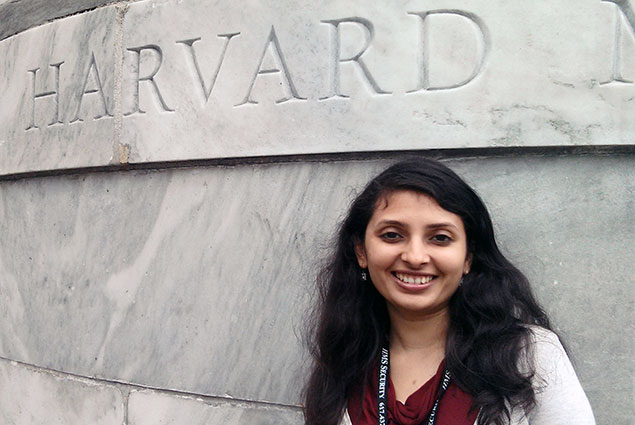Energy Systems Spotlight

Sejal Turakhia, DTZ-A UGL, MS Energy Systems, 2012—Sejal Turakhia has been working as an energy efficiency analyst at DTZ-A UGL, a global corporate real estate services & facilities management company, since her graduation from Northeastern in January 2012. Her work primarily focuses on a project at the Harvard Medical School, where her initiatives contribute to making a greener campus. In an interview, Sejal tells us about her responsibilities and how the Energy System program’s courses prepared her for this role.
Please describe your job responsibilities as Energy Efficiency Analyst at DTZ-A UGL Company and how they relate to the Energy Systems program. Tell me more about the Harvard Medical School campus project?
My job responsibilities as Energy Efficiency Analyst at the Harvard Medical School include performing energy/cost analysis by studying the energy usage and their utility costs, monitoring the usage of utilities like steam, electricity, chilled water, natural gas and domestic city water on a regular basis and observing their trends to check any abnormal usage, investigating if any building uses more than expected by collecting and analyzing the field data, and making future predictions of energy usage for each building across the campus. I am also a part of Harvard’s Green Energy Team which involves a group of enthusiasts from the fields of science, medicine, engineering, and business, trying to help making the campus green and sustainable. My job responsibilities include research on the solar lighting for the Harvard Main Quad, and finding out green and most cost effective solutions for drinking water as opposed to bottled waters. Graduating from the Energy Systems program helped me match the goals and expectations of the utilities industry, as well as provided me with a sound knowledge in the field of renewables like solar energy, along with economics and financial accounting that I use on a day to day basis in my company.
The Harvard Medical School campus has about 2.5 million sq. ft. area with a very complex and intense network of utility systems for the buildings which facilitates the best people to perform science of high level, making remarkable discoveries in alleviating human sufferings caused by diseases.
Which courses have particularly helped you gain the skills necessary to excel in your role at DTZ-A UGL? How have they helped?
The “Fundamentals of Energy Systems Integration” course is one of the important courses that helped me get a sound knowledge of applying various energy systems for a building, using cogeneration as well as renewables and determining the optimum solution after performing the energy and cost economics. Courses in accounting, financial decision making, and especially “Economic Decision Making” contributed to gaining a comprehensive knowledge of the economics side in the energy industry, which is equally important as having the technical expertise to make best decisions related to precious and soon to be depleting non-renewable energy sources. Some of my favorite and very interesting courses were “Solar Thermal Engineering”, an advanced level course that helped me gain an insight in Solar Engineering and designing solar systems involving their installation, orientation and position and various critical factors.
“Environmental Systems” provided me with the knowledge to design energy efficient buildings with best possible options of heating/cooling and various mechanical systems in the building from the architectural point of view. “Environmental Issues in Manufacturing and Product Use” provided students with the opportunity to work on a project of their choice and do a Life Cycle Analysis with cool eco-auditing softwares.
How have your experiences in the ES program enabled you to tackle problems in the corporate / business world or how do you think, in the future, this program will enable you to tackle such problems?
Time management, team work, leadership qualities, and independent problem solving skills are some of the main qualities that I have gained from the program that one needs in order to tackle problems successfully in the corporate world. I inculcated these competencies through various courses and independent projects that I completed in the ES program at Northeastern.